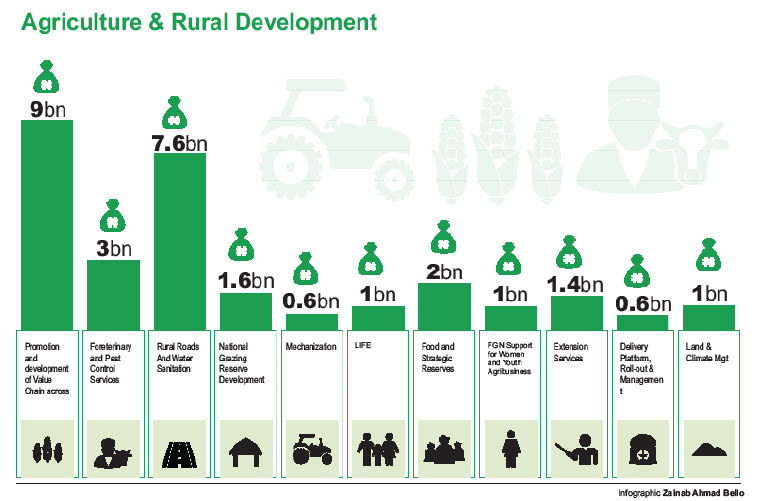Key agric projects FG wants to spend N30bn on
For many years now, fiscal spending on agriculture has remained in the lowest position among the key sectors of the nation’s economy. Despite the July 2003 Maputo commitment that require 10% of the national budget, which Nigeria is a signatory to, spending has never gotten to even 5% about 17 years since that declaration. This […]

For many years now, fiscal spending on agriculture has remained in the lowest position among the key sectors of the nation’s economy.
Despite the July 2003 Maputo commitment that require 10% of the national budget, which Nigeria is a signatory to, spending has never gotten to even 5% about 17 years since that declaration.
This neglect has affected the sector grossly and left the country, which has 84 million hectares of arable land and potentials for three million hectares for irrigation, trailing behind Kenya, South Africa, Zambia, Ethiopia and more recently Rwanda.
For the livestock sector, the disproportionate neglect led to the bloodbaths, killings, unreasonable hatred between livestock and sedentary farmers across the country.
Where billions will go into in 2020
The Federal Ministry of Agriculture and Rural Development seeks to spend over N9 billion in the promotion and development of value chain activities across more than 30 different commodities.
The challenge for many observers is that despite such budgetary allocation in the previous budget, value chain development is still in the lowest ebb in the country. Those recording success are funded by international bodies and donor agencies.
On rural roads and water sanitation, the ministry will spend N7.64 billion. However, it is observed that most of the rural roads are said to be paddled constituency projects, including even streetlights in areas – senatorial districts or constituencies – of key officials at the National Assembly and other politicians.
With regard to the Food and Strategic Reserve, for which many have criticised government of not having functional reserve system that will cushion the effect of glut, the sum of N2.01 billion will go for stocking silos, although many of those silos have been concessioned under a PPP arrangement.
In the livestock sector government will spend N1.6 billion for national grazing reserves development. For a sector that has seen the worst crises in the last 10 years, many expected government to spend more on this.
Already threatened by anthrax outbreak in neighbouring Niger Republic, the Federal Government will spend N3 billion for veterinary and pest control services to keep the country safe from disease incursion.
One of the programmes Chief Audu Ogbeh has introduced is the Livelihood Improvement Family Enterprise (LIFE). This year, the sum of N1.01 billion will be spent on it. An additional N1.02 billion will also be spent as federal government support for women and youth in agribusiness.
Although during Ogbeh’s tenure, he announced the death of the Growth Enhancement Scheme (GES)- an e-wallet system introduced by former minister of agriculture under Goodluck Jonathan, Dr Akinwumi Adesina, it appears again in the 2020 budget with N655 million for GES delivery platform, roll-out and management.
In his New Year message to Nigerians, President Buhari announced that government will train 50,000 extension workers to support the existing 7,000. In this regard, the ministry will spend N1.49 billion for extension services. But on mechanization, it plans to spend only N683 million in a country still using traditional implements like hoe and cutlass.
Climate change is real. Decortication is eating deeper into the north, faster than what was previously thought. The sum of N1.08 billion will go for “land and climate management.”
